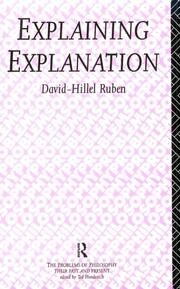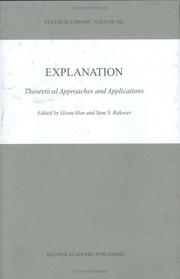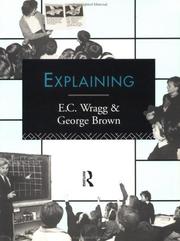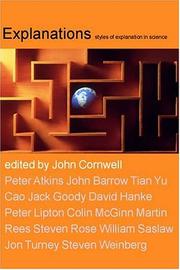| Listing 1 - 10 of 232 | << page >> |
Sort by
|

ISBN: 0415087651 9780415087650 Year: 1992 Publisher: London : Routledge,
Abstract | Keywords | Export | Availability | Bookmark
 Loading...
Loading...Choose an application
- Reference Manager
- EndNote
- RefWorks (Direct export to RefWorks)

ISBN: 1402000170 Year: 2001 Publisher: Dordrecht : Kluwer academic,
Abstract | Keywords | Export | Availability | Bookmark
 Loading...
Loading...Choose an application
- Reference Manager
- EndNote
- RefWorks (Direct export to RefWorks)
Book
Year: 1961 Publisher: London: Routledge,
Abstract | Keywords | Export | Availability | Bookmark
 Loading...
Loading...Choose an application
- Reference Manager
- EndNote
- RefWorks (Direct export to RefWorks)
Book
ISBN: 9780198826965 0198826966 Year: 2018 Publisher: Oxford: Oxford university press,
Abstract | Keywords | Export | Availability | Bookmark
 Loading...
Loading...Choose an application
- Reference Manager
- EndNote
- RefWorks (Direct export to RefWorks)
When you light a match it is the striking of it which causes the lighting; the presence of oxygen in the room is a background condition to the lighting. But in virtue of what is the striking a cause while the presence of oxygen is a background condition? When a fragile glass breaks it manifests a disposition to break when struck; however, not everything that breaks manifests this disposition. So under what conditions does something, in breaking, manifest fragility?0After some therapy a man might stop being irascible and he might lose the disposition to become angry at the slightest provocation. If he does then he will have lost the disposition after an "internal" change. Can someone lose, or gain, a disposition merely as a result of a change in its external circumstances? 0Facts about the structure of society can, it seems, explain other facts. But how do they do it? Are there different kinds of structural explanations? Many things are said to be causes: a rock, when we say that the rock caused the window to break, and an event, when we say that the striking of the window caused its breakage. Which kind of causation - causation by events, or causation by things - is more basic? In Causation, Explanation, and the Metaphysics of Aspect, Bradford Skow defends answers to these questions. His answers rely on a pair of connected distinctions: first is the distinction between acting, or doing something, and not acting; second is the distinction between situations in which an event happens, and situations in which instead something is in some state. The first distinction is used to draw the second: an event happens if and only if something does something.--
Causation --- Explanation

Abstract | Keywords | Export | Availability | Bookmark
 Loading...
Loading...Choose an application
- Reference Manager
- EndNote
- RefWorks (Direct export to RefWorks)
Explanation --- Teaching
Book
Year: 2010 Publisher: Firenze, Italy : Firenze University Press,
Abstract | Keywords | Export | Availability | Bookmark
 Loading...
Loading...Choose an application
- Reference Manager
- EndNote
- RefWorks (Direct export to RefWorks)
An endocentric language is a language whose verbs are lexically precise and concrete whereas its nouns are abstract and vague. An exocentric language has lexically precise and concrete nouns and abstract verbs. The Germanic languages prove to be endocentric and the Romance languages exocentric. The lexical differences entail differences at other levels as well, linguistic as well as extralinguistic. This multilingual volume contains a selection of papers presented at the two day Italian-Danish linguistic seminar Lingua, cognizione e identità: estensioni della tipologia delle lingue endo- ed esocentriche held at the Italian Department of the University of Florence on the 22nd and 23rd of September 2009. The papers challenge the endo-/exocentric approach at various levels (lexicon, grammar, language infrastructures, socio cultural reflections) with examples from the Romance languages (Italian and French) and the Germanic languages (English, German and Danish).
Book
Year: 2010 Publisher: Firenze, Italy : Firenze University Press,
Abstract | Keywords | Export | Availability | Bookmark
 Loading...
Loading...Choose an application
- Reference Manager
- EndNote
- RefWorks (Direct export to RefWorks)
An endocentric language is a language whose verbs are lexically precise and concrete whereas its nouns are abstract and vague. An exocentric language has lexically precise and concrete nouns and abstract verbs. The Germanic languages prove to be endocentric and the Romance languages exocentric. The lexical differences entail differences at other levels as well, linguistic as well as extralinguistic. This multilingual volume contains a selection of papers presented at the two day Italian-Danish linguistic seminar Lingua, cognizione e identità: estensioni della tipologia delle lingue endo- ed esocentriche held at the Italian Department of the University of Florence on the 22nd and 23rd of September 2009. The papers challenge the endo-/exocentric approach at various levels (lexicon, grammar, language infrastructures, socio cultural reflections) with examples from the Romance languages (Italian and French) and the Germanic languages (English, German and Danish).

ISBN: 1280698853 9786613675811 0191547336 9780191547331 9781280698859 0198607784 9780198607786 6613675814 0191647438 1383031258 Year: 2004 Publisher: Oxford : Oxford university press,
Abstract | Keywords | Export | Availability | Bookmark
 Loading...
Loading...Choose an application
- Reference Manager
- EndNote
- RefWorks (Direct export to RefWorks)
Our lives, states of health, relationships, behavior, experiences of the natural world, and the technologies that shape our contemporary existence are subject to a superfluity of competing, multi-faceted and sometimes incompatible explanations. Widespread confusion about the nature of "explanation" and its scope and limits pervades popular exposition of the natural sciences, popular history and philosophy of science. This fascinating book explores the way explanations work, why they vary between disciplines, periods, and cultures, and whether they have any necessary boundaries. In other words, Explanations aims to achieve a better understanding of explanation, both within the sciences and the humanities. It features contributions from expert writers from a wide range of disciplines, including science, philosophy, mathematics, and social anthropology.
Explanation. --- Explanation (Philosophy) --- Knowledge, Theory of --- Explanation --- Philosophy of science
Book
ISBN: 1108997023 1316518175 1009002589 1009002783 Year: 2022 Publisher: Cambridge ; New York, NY : Cambridge University Press,
Abstract | Keywords | Export | Availability | Bookmark
 Loading...
Loading...Choose an application
- Reference Manager
- EndNote
- RefWorks (Direct export to RefWorks)
All people desire to know. We want to not only know what has happened, but also why it happened, how it happened, whether it will happen again, whether it can be made to happen or not happen, and so on. In short, what we want are explanations. Asking and answering explanatory questions lies at the very heart of scientific practice. The primary aim of this book is to help readers understand how science explains the world. This book explores the nature and contours of scientific explanation, how such explanations are evaluated, as well as how they lead to knowledge and understanding. As well as providing an introduction to scientific explanation, it also tackles misconceptions and misunderstandings, while remaining accessible to a general audience with little or no prior philosophical training.
Science --- Explanation. --- Philosophy.
Book
ISBN: 9780197660867 Year: 2023 Publisher: Oxford Oxford university press
Abstract | Keywords | Export | Availability | Bookmark
 Loading...
Loading...Choose an application
- Reference Manager
- EndNote
- RefWorks (Direct export to RefWorks)
"This book aims to answer two main questions about Aristotle's theory of causality and causal explanation, especially in relation to natural science. (1) How does he answer main philosophical questions about causes to which he thinks his predecessors' answers are flawed? (2) How do his answers bear on the main questions we confront in thinking about causality in general? The texts that deal with causality directly are analyzed against the background of his criticisms of his predecessors and his broader views about explanation, highlighting their theoretically important commitments. This allows us to reveal the conceptual architecture of his theory. The basic theory is then applied to two questions about causality, one metaphysical and one epistemological. The metaphysical question is how to account for the relation between causes and what they cause, in light of a fundamental tension between different desiderata for causal explanations. Aristotle's answer is pluralistic: he does not think that there is one metaphysical relationship between causes and what they cause even within a given mode of causality. The epistemological question asks how we grasp causes, and grasp them in a way that yields scientific understanding. Aristotle's answer is again a pluralist one: metaphysically different phenomena demand different cognitive resources, and some are more accessible than others. Nevertheless, there is a discernible path from simpler to more sophisticated types of cognitive grasp on causality. Aristotle thus aims to provide a non-reductionist account of causality that still leaves room for a substantive conception of understanding in natural science"--
Causation. --- Explanation. --- Aristotle.
| Listing 1 - 10 of 232 | << page >> |
Sort by
|

 Search
Search Feedback
Feedback About UniCat
About UniCat  Help
Help News
News